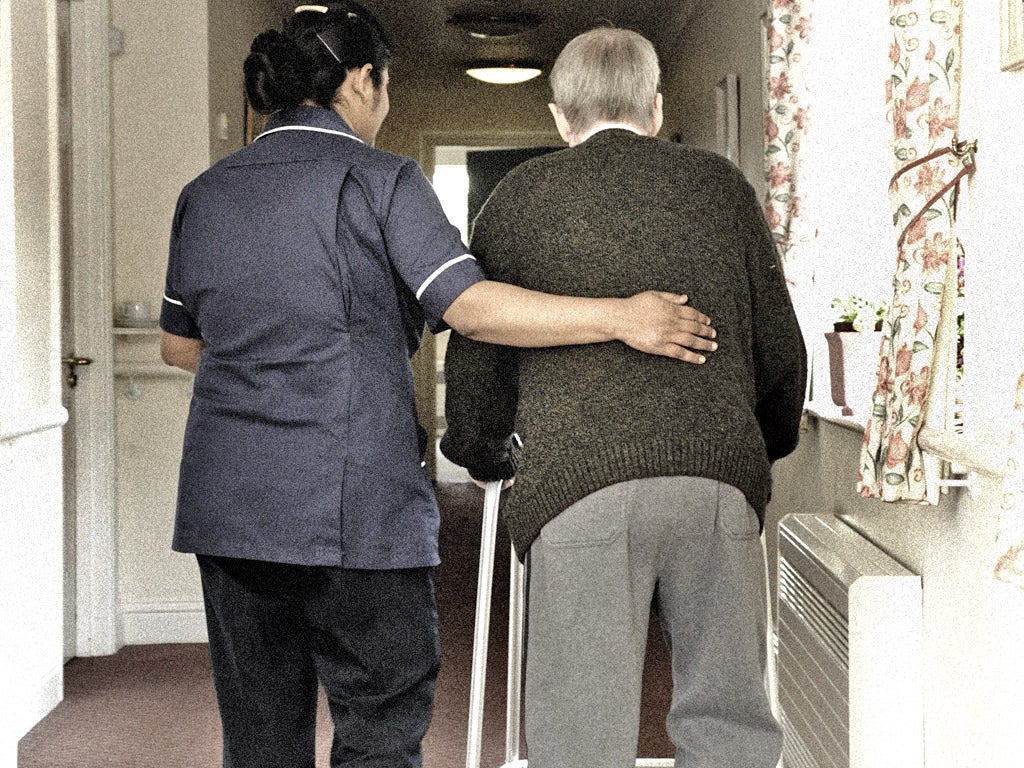Elderly could be made to pay up to £100,000 for care
Critics attack 'financial vacuum' at heart of plan

Elderly people could be forced to pay up to £100,000 towards the cost of their care before the state begins picking up the bill, the Health Secretary, Andrew Lansley, suggested yesterday.
The figure is nearly three times the £35,000 cap suggested by Andrew Dilnot, the author of an independent report into care funding. While the economist proposed a universal scheme that would cover the care fees of all pensioners, Mr Lansley indicated he was also considering the possibility of a voluntary scheme that would cap only the contributions of those who had paid for some form of insurance.
Pensioners moving into residential care homes would be able to borrow money from their local authorities, meaning that their homes would not have to be sold to meet costs until after they had died.
Mr Lansley said his White Paper represented "the most radical reform of the social care system in 64 years".
However, a Department of Health analysis shows the Government has looked at a number of options, including a £75,000 and a £100,000 limit.
The threshold would be applied to individuals, forcing couples to pay up to £200,000. There could also be a separate £10,000 cap on bills for "hotel costs" to cover living expenses of pensioners in care homes.
Mr Lansley said there were "immense financial pressures" on the social care system and many other priorities. Any decision will not be taken before the Chancellor George Osborne's spending review, which is expected late next year or in 2014.
"I'm not going to pre-empt the outcome of the spending review but the fact is that we are in a situation with a structural deficit we have to eliminate. We have immense financial pressures," Mr Lansley said.
But Andy Burnham, the shadow Health Secretary, called on the Government to use half of a £1.4bn NHS underspend returned to the Treasury for social care.
"Today's proposals are meaningless without the money to make them a reality. George Osborne should get his act together and hand back half the money he has taken from the health budget," Mr Burnham said.
Brendan Barber, the general secretary of the TUC, said: "While the Government seems to have accepted the idea that there should be a limit on how much people will have to pay towards the cost of care in their old age, too many families will still be forced to sell their homes while ministers make up their minds as to how high this cap should be."
The King's Fund health think-tank criticised the lack of detail in the plan, saying there was a "financial vacuum" at the heart of the proposals.
Q&A: What it means for you
Q. What is the current system?
A. Individuals' needs are assessed by local councils and classified as low, moderate, substantial or critical. Most councils will no longer fund care for people classified as having low or moderate needs. People with savings of more than £23,250 who need help at home must pay in full. Those with assets of less than £14,250 get all their care paid for. Those with savings between £14,250 and £23,250 must make a contribution to their costs. People needing residential care face the same means test but the value of their home is taken into account.
Q. What changes are proposed?
A. The Government has said it accepts the principles of the Dilnot commission – which suggested a cap of £35,000 on lifetime residential care costs. But it has not said how it will be paid for or where the cap will be set. It will introduce a universal deferred payments scheme to allow pensioners going into residential care to borrow from their local council rather than be forced to sell their home during their lifetime. But it has not given details of the interest charged. There will be a national minimum eligibility threshold for adult social care, but again few details were released.
Q. When will it be decided?
A. The Government has promised to take a final decision on care funding in the next spending review, which is expected in 2014, although it could be brought forward to 2013.
The limit applies to individuals, so couples could pay as much as £200,000 for their care
Join our commenting forum
Join thought-provoking conversations, follow other Independent readers and see their replies
Comments